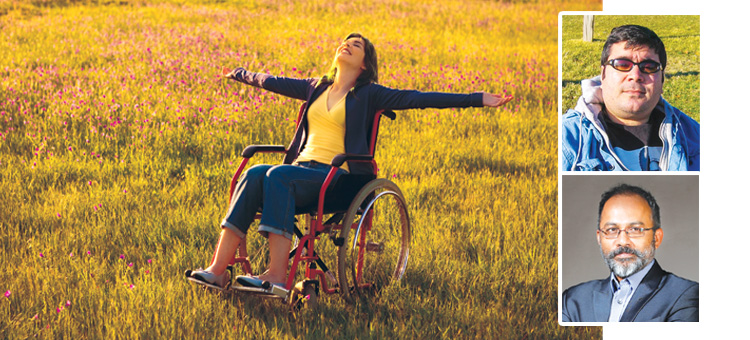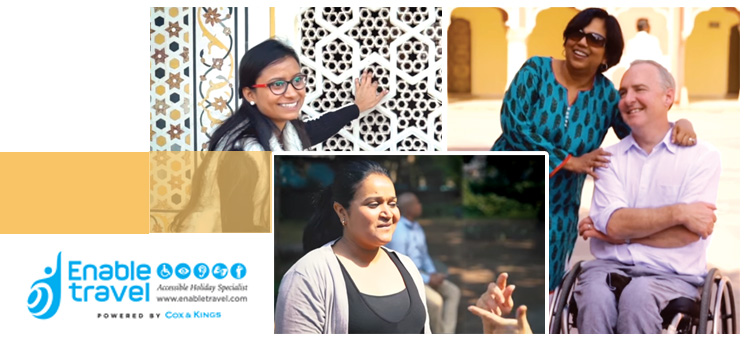Mumbai: The day we sat down with the team of Enable Travel to discuss their two year old journey, Big Bazaar, India’s largest hypermarket chain had announced that their 140-odd outlets were now wheelchair accessible.
Like any other business activity, tourism stands to gain if it becomes more inclusive and accessible. As per the 2011 census data of the Government of India, there are 27 million disabled people in the country. According to Leading from the Front – Disability and the Role of the Board, a report prepared by KPMG in association with Purple, 1 billion people worldwide, about 15 per cent of the global population, are disabled. The global ‘Purple Dollar’ – the collective spending power of disabled customers and their families – is estimated to be in the region of $8 trillion.
That was the starting point as far as the market segment was concerned for Cox & Kings (CNK), one of India’s largest integrated travel services companies, which believes in branching out to Special Interest categories which are growing. Enable Travel was born in 2017. Today, CNK has various divisions focussing on special interest groups (SIGs) like women travellers (Getaway Goddess), adventure (Trip 360), road trips (Self-Drive 365), gastronomy (Tour to Feast) and education (Curious Cat Chronicles) apart from Enable Travel.
Debolin Sen, Head – Special Interests (Enable Travel, Self-Drive 365 and Tour To Feast), Cox & Kings said, “When we started there was no one in the market to handhold disabled travellers. Our challenge was to create products and experiences they would appreciate.”
The Enable Travel team which includes disabled experts like Rustom Irani (wheelchair), Preeti Monga (visually impaired), Shama Noorani (wheelchair), Dr. Alim Chandani (deaf) and others, did extensive research and collated data to understand the needs, attitudes, aspirations and expectations of disabled travellers. “We ended up focussing on four categories: wheelchair users (20 per cent of 27 million) and visually impaired (19 per cent), followed by those who are deaf and with speech-related problems,” said Sen. “Next we decided which part of the country we wanted to sell.”
The Enable Travel team audited the entire country. Considering the fact that foreign visitors preferred the Golden Triangle (Delhi, Agra, Jaipur), West India (Mumbai, Goa) and the Southern trail those were audited and documented first. “This included answering a massive questionnaire on topics like what to see, where to stay and how to get there, keeping in mind the needs of disabled travellers,” said Irani. The inputs were used by the product team to create packages and experiences.
By the end of 2017, Enable Travel International was launched opening up outbound. Again the team of experts travelled around the world to audit and document each destination.
As on date, more than 220 destinations globally are being offered by Enable Travel, of which more than 100 are in India. Most of Western Europe has been covered – France, Germany, Spain and the UK to name a few.
In the USA, the East and West Coast have been included. South Asia and the Middle East too have been added. “These are travel packages created by the disabled for the disabled. Every disabled person who wants to travel thinks, “Can I?” We help them say “Can do”. This is our unique value proposition,” affirmed Sen.
There is no destination which is 100 per cent accessible. In London, considered an accessible city, their Underground needs a lot of work. In the United States also, not every city is accessible. Scandinavian countries are doing very well to ensure accessibility for all.
Golden Breaks is a sub-category under Enable Travel specially to cater to the travel needs of senior citizens. “Like disabled travellers, senior citizens also have special needs. Travel becomes a hardship if they are treated like regular customers,” added Irani.
Leisure and Pilgrimage are two interests sought after by senior citizens and Enable Travel under its Golden Breaks initiative, ensures this segment is well taken care of, be it outbound, inbound or domestic. As per the 2011 census, India has 10.4 crore senior citizens. As travellers, they do not have a fixed time schedule, enjoy sufficient budget and may need care and assistance.
Celebrating its second anniversary, Enable Travel is India’s number one accessible holiday specialist and the only tier I player crafting and executing unique experiences for disabled communities. It is also one of just four to five global accessible travel service providers who offer inbound and outbound. At the Destinations for All – World Summit on Accessible Tourism in Brussels in October 2018, Enable Travel was the only travel brand in accessible tourism invited from Asia.
Recently Enable Travel tied up with Ezy Mov, India’s first wheelchair accessible taxi service, launched in Goa, which is an end-to-end accessible destination. “Goa Tourism is collaborating with us to include accessible tourism as an initiative in the new Tourism Policy of the State,” Sen said. It could even serve as a template for other State tourism boards and India Tourism. Confirming this, Sen added, “We want to replicate the Goa model in other states. That’s the immediate future for us.” Ezy Mov is also ramping up. Enable Travel is joining like-minded partners to create an ecosystem so that this travel segment matures and grows.
The team has engaged with the disabled community extensively across India through numerous on the ground activations. “The more disabled people come out and experience travel, you will see government and private players looking at this niche segment and starting to invest and making destinations and attractions more and more accessible,” said Irani. “Getting disabled people to think and act on travel is our main focus.”
Creating India’s first accessible bowling experience in Bengaluru (soon in Pune too with Smaaash) and introducing the deaf to white water rafting on the Ganges using sign language have been path-breaking for the community. Enable Travel offers only destinations which are fairly accessible. They have also invested in equipment like roll-a-ramps (for normal usage, as and when needed, as well as for areas which could be out of bounds, like religious places), hiking chairs (to access forts, palaces and undulating mountainous terrain), amphibious wheelchair (to enjoy the beach, the sea and indoor pools) and even portable commode chairs (for hassle-free road travel).
The price of an Enable Travel package is not higher compared to CNK’s regular packages except for mark-up depending on specialised services sought like say a caregiver. Accommodation options ranging from three to five star hotels are offered. “Our packages are not meant only for upscale customers. We have a lot of demand coming in from budget travellers as well,” informed Sen.
In South Africa, Kenya, Tanzania and many other national parks around the world, wildlife safaris are accessible. But that was not the case in India till recently. In October 2018, Enable Travel opened up wildlife in India. “We conducted the first audit in Kanha National Park, Madhya Pradesh by creating the first accessible Maruti Gypsy jeep and performing the toughest trails with our disabled experts Rustom and Preeti,” said Sen. The success at Kanha will be replicated across all major wildlife parks in India.
The Enable Travel team performs research, audit, introduces new experiences along with specialised service providers on the ground, community engagement and new business development through like-minded partners around the world. CNK takes care of product development, pricing, distribution network and sales & marketing. For the visually impaired, tactile travel experiences (touch and feel-based) which help them imagine have been curated. For the deaf, ISL (International Sign Language) and American Sign Language (ASL) interpreters are provided. The support crew is well-trained for special experiences.
Commenting on the future, Sen said, “We have to maintain our aggressive business growth and get more disabled people and senior citizens to travel. Many more points/destinations, especially off-beat, have to be audited. We have to open South America, Machu Picchu especially. We have already added mass destinations and now will open exotic and niche ones. Wildlife and adventure need to be opened up more in India. We also want to create India’s first accessible trekking trail.”
Also on the cards is opening up the Andamans for water sports like scuba diving for wheelchair users. Successful pilots have been conducted. The long-term dream is to make the Kumbh Mela accessible. Cruise is also gaining traction as the product is increasingly becoming disabled-friendly.
Unfortunately, accessible tourism is not yet a separate pavilion (like Medical Tourism or LGBT Tourism) at major travel trade fairs. ITB Berlin has a separate day for accessible tourism on the sidelines of the main event which is a fairly recent addition.
In simple terms, welcoming disabled guests makes perfect business sense. A ramp costing Rs. 1500 at a restaurant would result in 2x to 3x revenue because disabled customers generally do not travel alone but mostly with a caregiver and/or family. It is something CNK and Enable Travel are hugely betting on.






